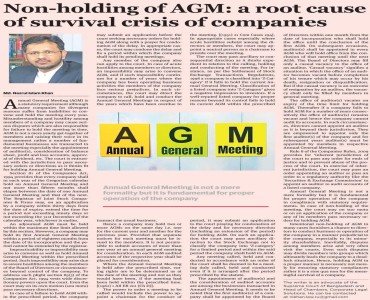
Md. Nazrul Islam Khan is an Advocate of the Hon'ble Supreme Court of Bangladesh. He is the Head of 'Corporate Legal Solutions'. Since 2012 he has been serving a number of renowned business groups in Bangladesh and thus, acquired experiences to defend corporate clients’ interests meaningfully in several aspects. It provided him opportunities to deal with complicated cases of divergent natures and solve them successfully. He is an orator as well as mentor on business laws. He is also a freelance writer and writes regularly in national English dailies on corporate legal issues.
Admiralty Cases

Since there is no Ordinary Original Civil Jurisdiction or Extra-Ordinary Original Civil Jurisdiction of this court to-day, part IX and Order XLIX of the Code are practically useless. It should further be remembered that the juris- diction exercised by this court under the Admiralty Act, Court the Companies Act and other statutory pro- visions are neither Ordinary Original Civil Jurisdiction nor Extra-ordinary civil Jurisdiction of this court rather they are Special Statutory Jurisdiction of this Court and the actions initiated under those laws are governed by the respective statutes and the rules framed thereunder. We have already seen that the jurisdiction exercised by this court as Admiralty Court emanates from the statute and the procedure is governed by the Rules framed thereunder. Thus Rule 35 of the Admiralty Rule will prevail over the provisions of the Code. Besides, the provisions of Part IX and Order XLIX of the Code have no manner of application to the instant cases, as the Admiralty Jurisdiction is completely different from both Ordinary Original Civil Jurisdiction of the erstwhile High Court. In Rule 3 of the Admiralty Rules it has been provided that a suit shall be instituted by a plaint drawn up, subscribed and verified according to the provisions of the Code and excepting as provided in Rule 3, there is nothing in the Rules which made the Code applicable for any other purpose in a proceeding in suit brought before the Admiralty Court. Provision of Rule 51 is very clear and it can not be construed to say that it makes the Code applicable to Admiralty Suit. Thus I do not find any force or substance in this argument.
Ref: 10 M.L.R(HC)(2005) -212
Company Cases

A claim was made against a company in liquidation for damages. The liquidator issued a summons to have it determined whether the claims should be allowed and the judge made an order for an enquiry into the amount of damage sustained and that the claimant be per. mitted to prove for the sum so ascertained. The damages were so ascertained by the registrar and a proof carried in. The liquidator rejected the proof on the ground that a shareholder, while retaining his shares, cannot claim damages in respect of any loss in respect of his shares:
HELD: this objection was too late. It should have been taken on the hearing of the summons or on appeal therefrom.
[EDITORIAL NOTE. Generally speaking, trustees in bankruptcy and liquidators are allowed a wide latitude in objecting to claims in order that the rights of creditors may be fully protected. This rule is here in conflict with the rule that a party must bring forward all his claims or defences when the matter is before the court or be estopped from bringing further proceedings. In this case the latter rule prevailed and it would appear that a liquidator cannot reopen a proceeding in a winding up, if he has omitted to carry in all his objections. He can, of course, in general reopen proceedings before the winding up.
Ref: 1 All ENG L.R (1936) -406

Online Program On Company Law
- An online program namely ‘Nitty-Gritty of Company Law’ has been going on and the Head of Chamber has been conducting the classes.
Basic Features:
- It’s an online program on Company Law through Zoom apps.
- 25 classes in 02 months.
- Discussion shall be in the light of judgments of passed by the apex courts of Bangladesh, India, Pakistan and UK.
- Lecture sheet and copies of judgments will be provided.
Areas of Practice
The basic areas of practice are as follows:
- Arbitration
- Aviation
- Constitutional Law
- Shipping Law
- Company Law
- Commercial contract / tender/ project finance
- Customs Law
- Intellectual Properties
- Land / Real Estate
- Medical Negligence
- Power and Energy
Latest News

Non-holding of AGM: a root cause of survival crisis of companies
Non-holding of AGM: a root cause of survival crisis of companies

Discretion of Court to liquidate companies
Discretion of Court to liquidate companies








